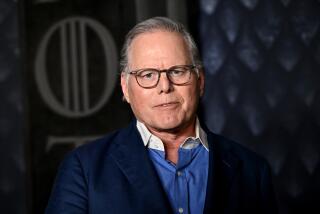TOP STORIES -- April 4-9
U.S. Charges Reliant Over State Energy Crisis
The Justice Department brought the first criminal charges against a company for alleged misconduct in the California energy crisis, accusing Reliant Energy Services of inflating electricity prices in June 2000.
The six-count indictment, returned by a federal grand jury in San Francisco, also named four current or former employees of the Houston-based unit of Reliant Resources Inc. According to law enforcement officials, Reliant shut down four of its five California power plants to create a bogus electricity shortage and give prices a sharp lift -- generating profits that helped the company avoid a looming multimillion-dollar loss.
Reliant Energy Services and the four former or current employees all are charged with wire fraud, conspiracy and commodity-price manipulation.
Reliant executives defended the company and its employees, saying the actions targeted by the Justice Department were completely legal at the time.
*
California Employers Add Just 5,200 Jobs
California’s job growth stalled in the last two months, sharply lagging behind the nation’s job-creation pace and raising questions about the durability of the state’s recovering labor market.
Hurt by declines in government and manufacturing jobs, nonfarm employers in the state added 5,200 jobs last month -- a fraction of what economists were looking for after U.S. payrolls had increased by 308,000 in March.
California accounts for about 11% of the U.S. labor force, and some analysts were expecting the state to show 40,000 more jobs last month.
Making matters worse, the state’s previously reported 8,800 gain in February employment was revised to a net loss of 2,300 jobs. With hiring sluggish, the state’s unemployment rate rose in March to 6.5% from 6.3% the previous month.
Government payrolls have fallen by 56,900 in the last 12 months. And despite a steadying of manufacturing jobs nationally last month, California’s factory payrolls shed another 2,000 jobs in March, bringing to 39,600 the losses over the last year.
*
Smoker’s $21.7-Million Award Is Overturned
A state appeals court threw out a $21.7-million award against two tobacco giants, ruling that a jury shouldn’t have considered evidence of industry misconduct in a 10-year period during which cigarette makers were protected from litigation.
The decision marked the first time a jury award had been overturned as a result of a California Supreme Court ruling in 2002 that determined the effect of previous legislative protections for the industry.
That ruling said that because the state had shielded the tobacco industry from lawsuits from 1988 to 1998, diseased smokers who sue may not present evidence of misconduct during those years.
Leslie Whiteley, the cancer-stricken smoker who won the $21.7-million verdict against Philip Morris USA (now known as Altria Group Inc.) and R.J. Reynolds Tobacco Holdings Inc., died shortly after it was awarded in 2000. Madelyn J. Chaber, who had represented Whiteley, said the Whiteley family would ask for a rehearing, appeal to the state high court or retry the case.
*
Senate Passes Pension Plan Reform Bill
The Senate passed legislation that could save companies an estimated $80 billion in pension costs over the next two years -- and, perhaps more important, keep them from scrapping pension plans entirely.
The bill, which had been approved by the House, changes the interest rate used in figuring how much money companies must set aside in their plans.
The calculation is now tied to the interest rate on the 30-year Treasury bond, which is no longer issued. Under the bill, the rate would be tied to an index of high-quality corporate bonds.
The bill would provide an immediate financial benefit to companies with traditional pension plans, which are hopeful that President Bush will sign the legislation before the April 15 deadline for quarterly plan contributions.
A separate provision of the bill, called the Pension Funding Equity Act, would give additional relief to the troubled airline and steel companies and to some union plans.
*
Howard Stern Kicked Off Radio Stations
The nation’s largest radio chain booted shock jock Howard Stern off its stations after regulators proposed fining the company $495,000 for airing Stern’s sexually explicit broadcasts.
The Federal Communications Commission cited Clear Channel Communications Inc. for “willfully broadcasting indecent material” last April on stations in San Diego and five other cities. The fine was the third six-figure penalty levied this year against Clear Channel, which owns 1,200 stations.
In March, Clear Channel temporarily suspended the Stern show carried on six stations. The latest decision makes the move permanent, Clear Channel Radio President John Hogan said.
Stern’s show is syndicated by Infinity Broadcasting Corp., a unit of Viacom Inc. Infinity carries Stern on 18 stations.
In a statement, Stern likened the government sanctions to a “McCarthy type ‘witch hunt.’ ”
*
Clear Channel to Face Trial in Promoter’s Suit
A federal judge in Denver has ruled that there is evidence that the nation’s biggest radio broadcaster and concert promoter abused its clout by threatening to keep artists off the air unless they performed at its shows.
U.S. District Judge Edward W. Nottingham ordered Clear Channel Communications Inc. to stand trial in August and defend its business practices after finding reason to believe “Clear Channel intends to manipulate artists’ promotion decisions and interfere with competitors by withholding airplay.”
The ruling came in a lawsuit filed in August 2001 by a Denver concert promoter. The suit accuses Clear Channel of violating state and federal antitrust laws.
San Antonio-based Clear Channel has denied the allegations and asked Nottingham to dismiss the case.
Nottingham set a trial date for Aug. 2.
*
Garamendi Sues Workers’ Comp Carrier
Insurance Commissioner John Garamendi sued California’s government-run workers’ compensation carrier, escalating a long-running feud over Department of Insurance efforts to regulate the $7.6-billion entity.
In a lawsuit in state court in San Francisco, Garamendi says he wants to review the State Compensation Insurance Fund’s finances to make sure that any savings from the workers’ comp reforms passed by the Legislature last year are passed on to California employers in the form of lower premiums.
The State Fund is a San Francisco-based nonprofit insurer of last resort for employers that can’t get workers’ comp coverage elsewhere. It has been locked in a turf battle with Garamendi. In May, the fund sued him, alleging he was illegally trying to take control of the insurer.
State Fund President Dianne C. Oki said Garamendi had a right to “report our financial condition to the Legislature.” But she objected to his demand that the fund bear the cost of “another, repetitive review” by outside consultants.
*
Yahoo Profit More Than Doubles in 1st Quarter
Yahoo Inc. said profit more than doubled and revenue nearly tripled for the first quarter as advertisers flocked back to the Internet.
Yahoo raised its financial forecast for the full year by about 12%, citing advertising gains, success in international markets and the increased willingness of people to pay for services.
The Sunnyvale, Calif., company earned $101 million, or 14 cents a share, as sales ballooned to $758 million. A year earlier, profit was $47 million, or 8 cents, on sales of $283 million.
In February, Yahoo ended a partnership with search-engine rival Google Inc. and launched its own service, which it built by spending more than $2 billion last year to acquire Overture Services Inc. and Inktomi Corp.
Yahoo ended the quarter with 5.8 million paying customers, up from 2.9 million in the same period last year.
For the full year, the company said sales would reach $2.41 billion to $2.52 billion, excluding some costs related to attracting ad viewers.
*
ABC Network May Oust Top Programmer
Walt Disney Co. is stitching together a plan to shake up its ABC network by tossing out its top programmer and turning the reins over to one of the company’s rising stars.
Details of the new management structure were far from settled.
But company sources said Anne Sweeney, president of the ABC Cable Networks Group and Disney Channel Worldwide, was expected to take over as president of the broadcast network, which continues to lag behind its competition.
ABC Entertainment Television Group Chairman Lloyd Braun, who as the network’s chief programmer has often clashed with Disney President Robert Iger, will soon leave his position, sources also said.
And to make room for Sweeney, they said, Alex Wallau, the network’s president and a former boxing commentator, is expected to step down, although he is likely to remain with the network he joined in 1976.
Disney and ABC executives declined to comment Tuesday.
*
For a preview of this week’s business news, please see Monday’s Business section.
More to Read
Inside the business of entertainment
The Wide Shot brings you news, analysis and insights on everything from streaming wars to production — and what it all means for the future.
You may occasionally receive promotional content from the Los Angeles Times.










